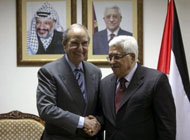Today, May 8, President Mahmoud Abbas and his PLO Executive Committee along with the Fateh Central Committee are expected to approve the launching of proximity talks with Israel. The Palestinians have already given the US's special envoy George Mitchell their unofficial approval during the latter's last two visits to the region. Also on May 8, Abbas said he would urge the US Administration to impose a solution that would lead to an independent Palestinian state.
"Mr. President and members of the American administration, since you believe in this [an independent Palestinian state], it is your duty to take steps toward a solution and to impose this solution," Abbas said in his speech before the Fateh Central Committee.
The Palestinian leadership also said had its limits regarding its acceptance to enter proximity talks. On May 7, chief Palestinian negotiator Saeb Erekat said Israel would have to choose between peace and settlements following a PA meeting with Mitchell in Ramallah. "If the price that we will pay for saying yes to Mitchell will be more settlements and more dictations, that's a big question mark about the possibility of continuing," said Erekat.
Mitchell, who arrived earlier this week, has met with Israeli Prime Minister Benjamin Netanyahu for two days in a row before meeting with Abbas as many times. According to media reports, Netanyahu told Mitchell he would offer the Palestinians "good will gestures" as part of the talks including the release of prisoners and the removal of some roadblocks in addition to easing the blockade on Gaza. However, the Israeli premier refused to freeze settlement construction in east Jerusalem, a demand the Palestinians and Americans made before.
This is apparent by an Israeli announcement on May 3 that 187,000 new settlement housing units would be built in east Jerusalem alone. The founder of the Israel Land Fund presented a plan last week to build the units in the city on land he said was "owned by individuals or the Jewish National Fund." The area in question is occupied east Jerusalem and the E-1 area between Jerusalem and the settlement of Maaleh Adumim, along with land between Ramallah and Bethlehem.
Still, it looks as if talks will be launched nonetheless as a last ditch effort go get the process moving. Not all Palestinians are happy with this development. On May 7, the Hamas leadership in Gaza criticized the move to return to talks saying it would only "legitimize Israel's occupation."
Furthermore, on May 5, Israeli Transportation Minister Yisrael Katz said his ministry had drafted a plan for a railway that would link "West Bank Palestinian and Jewish communities" with the existing train system that runs from Jerusalem to Tel Aviv and from Nahariya to Ashkelon. Similar to the light rail train being built in Jerusalem, this train's primary purpose would be to connect West Bank Jewish settlements to each other and to Israel. However, in order to sell the idea, which is a cover for further consolidation of the settlement enterprise in the West Bank, Katz uses familiar Israeli jargon, saying that with the plans for this train system, Israel wants to "extend our hand in peace.”
In Gaza, on May 7, Israel admitted that it restricted a number of goods into the Gaza Strip, making public a list of things allowed into Gaza. Israel only made the list public after a suit filed by Gisha, the Legal Center for Freedom of Movement. According to the list a number of food stuffs and household items are banned including coriander, sage, jam, chocolate, dried fruit, notebooks and empty flowerpots. The rights group is demanding that Israel offer a better explanation for the ban other than "security reasons."
In the West Bank, on May 4, Jewish settlers set a mosque in the Nablus-area village of Lubban Al Sharqiyye on fire, destroying the building and its contents including several copies of the Quran. President Abbas condemned the arson, which Israeli authorities first pinned on an electrical fault, and ordered the mosque to be immediately rebuilt.
The Palestinian condemnation was followed by that of UN Coordinator for the Middle East Peace Process Robert Serry. The statement released the next day expressed concern for the "number of attacks upon mosques in recent months, as well as violence against Palestinian property and individuals by extremist settlers."
"I condemn these attacks. It is vital that the Israeli Government impose the rule of law and that those responsible for such crimes are brought to justice," Serry said.
In a show of solidarity with their Palestinian brethren in the occupied territories, on May 5, chairman of the Kafr Kana public committee Mansour Dahamshy inside the Green Line said Palestinian-Israeli retailers would be "urged" to place lists of settlement products in their stores to inform shoppers of what to avoid. The move is in line with the recent Palestinian decision to boycott settlement products in the West Bank and Gaza.
"We are launching a campaign across the entire Arab sector to boycott all goods manufactured in the West Bank settlements,” Dahamshy said. “We mean to show solidarity with the Palestinian people and wage a battle against the settlements and the occupation.”
Finally, the Palestinians may reshuffle their cabinet again, if news reports are correct, as early as next week. According to Palestinian media sources, the new cabinet will include 10 to 12 ministers from Fateh alone. The shuffle is apparently the result of an agreement between Abbas and his Prime Minister Salam Fayyad.







